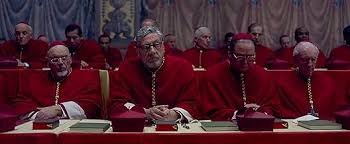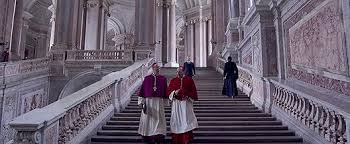To watch Conclave?
CONCLAVE, 120 minutes, starring Ralph Fiennes, Stanley Tucci, John Lithgow, directed by Edward Berger.

Many audiences will be eager to see Conclave because they have read Robert Harris’ exciting novel, the story of the death of the Pope, the gathering the Cardinals, the details required by Vatican regulations, the need for security, the holding of the conclave and the election of a new Pope.
The Catholic audience, especially those with a familiarity with the workings of the Vatican, the nature of the hierarchy, the different perspectives, even of popes during the last half century, will find a lot to interest, to enjoy, and a provocation especially about stances for going back to consolidate past traditions or an openness to contemporary issues in the wider world and their repercussions for the church.

However, reviews in American Catholic magazines and websites are very negative, Bishop Robert Barron urging people to run a mile from the film, declaring that it is a bad film technically in its ecclesiastical detail, in its liberal theology. These reviewers tend to see the film as realism and history rather than a version of a thriller novel.
For non-Catholic audiences, they will enjoy the delineation of characters and their variety, the elaboration of issues, machinations, religious motivations, personal and ecclesiastical challenges. But, it would be by way of observation, the same way non-British audiences may be intrigued by a drama about the intricacies and politics, say, of Britain’s Brexit campaign.
For audiences critical/sceptical about the church, it may seem rather esoteric or politically and ecclesiastically pompous.

But, back to the Catholic perspective. The central character is Cardinal Thomas Lawrence, played in a wonderful performance by Ralph Fiennes, always intense, but, even when not speaking, the audience very conscious of what concerns him, what he is thinking, what is making demands on him. He has wanted to resign as Dean of the Cardinals but the late Pope has refused. Which means that he has to organise the conclave.
So, there we are in the Sistine Chapel, workers in to protect security, the organisation of desks for the Cardinals, the sisters brought in to cook and cater for the conclave, the arrival of the Cardinals, from many different cultures around the world, some pomp and circumstance, some religious earnestness.

To dramatise the different points of view, there is the open-minded Cardinal Bellini, Stanley Tucci, the hoped-for candidate from the “progressive/liberal” attendees. On the other hand, there is the almost crusading, very Italianate Cardinal Tedesco, Sergio Castillitto, with an Italy-first mentality, opposed to contemporary changes, and militantly hostile to refugees making their way to Europe. And there are some complications with an African Cardinal from Nigeria, raising issues of sexuality in the church today, and some realities of sexual abuse. And, on the worldly side, the money-political perspective, there is an American Cardinal played by John Lithgow.
There is also an unexpected Mexican-born missionary in Congo and in Kabul, who arrives, claiming to have been made a cardinal “in pectore”, not publicly announced. Isabella Rossellini plays a very forthright nun who has no hesitation in speaking directly to the Cardinals.

Robert Harris’ novels read very well, compelling, covering a wide range of issues from ancient Rome to 20th century fascist and communist states, to contemporary issues. Which means that he has an interesting story to tell, the filmmakers generally checking to give some kind of authenticity to the storytelling - and an ending which will raise many eyebrows and leave many audiences suddenly shocked and, perhaps, struggling to work out what they think, and some questions for the future church (and it is the same ending as in the novel).